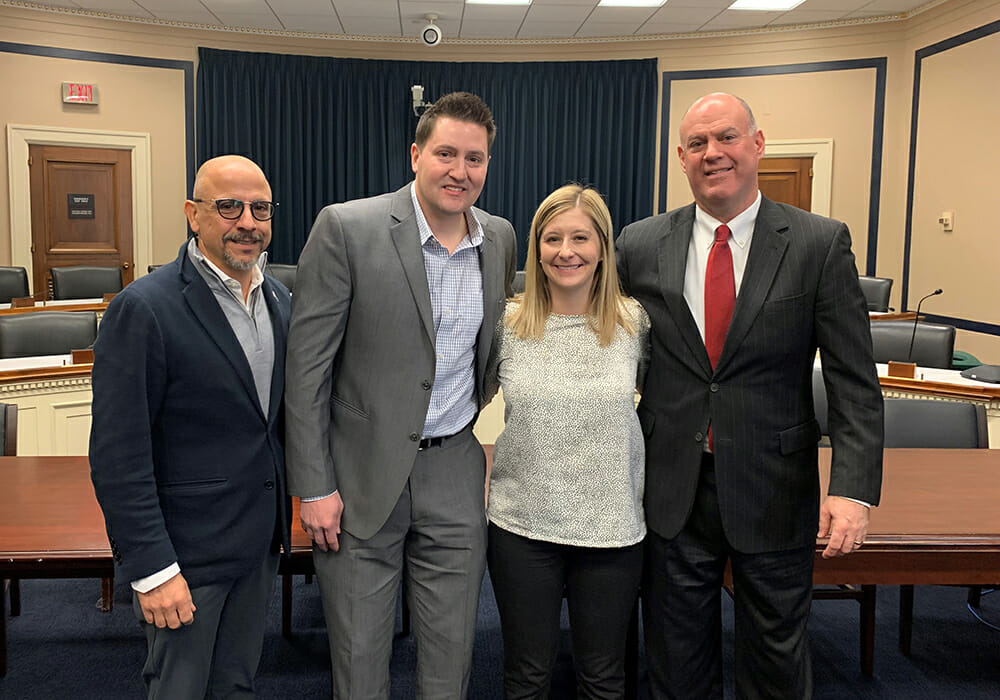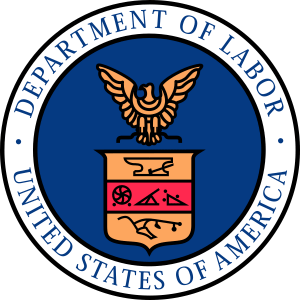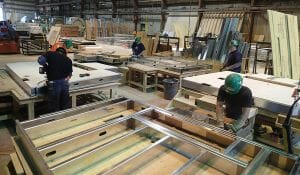MBI and Member Companies Brief House Committee on the Negative Impacts of the Davis-Bacon Act Expansion
MBI recently led a member delegation for a meeting in Washington D.C. with numerous Congressional staffers about the negative impact of the proposed Davis Bacon expansion. The staffers, representing Republican members of the House Education and Workforce Committee, heard from Jim Gabriel, President of Pennsylvania-based MODLOGIQ, and Alan Rasmussen, third-generation executive at Modern Building Systems in Oregon. Both shared their insights on exactly how the expansion would hurt their companies, their customers, and taxpayers in general. MBI Executive Director Tom Hardiman and industry lobbyists Jennifer Harper and Stacy Swanson also shared five reasons why this expansion is bad policy by the U.S. Department of Labor (DOL):
- Bad precedent for a government agency to expand its scope and grant “broader authority” without Congressional approval or hearings.
- Vaguely written rules provide little guidance as to when coverage applies, leaving contractors open to future claims, and unknown/undetermined scope and impact on construction costs.
- Detrimental to small and minority owned businesses. U.S. SBA Office of Advocacy submitted comments opposing this provision.
- Despite the claim that the financial impact is less than $100 per company, the cost of compliance is closer to $100,000 if the company can even comply.
- It does not fit! You cannot apply traditional on-site construction labor rates to a factory workforce with different skills, job functions, and responsibilities.

From left to right: Jim Gabriel of MODLOGIQ; Alan Rasmussen of Modern Building Systems; Kelly Tyroler, staff member for Congresswoman Virginia Fox (NC); and MBI executive director Tom Hardiman.
The purpose of the meeting was to keep the pressure on the DOL through Congressional channels, with the possibility of the House passing a Continuing Resolution to disapprove the new policy. Staffers representing the following Congressional representatives attended the meeting: Smucker (PA), Comer (KY), Walberg (MI), Allen (GA), Banks (IN), Miller (IL), Williams (NY), McClain (MI), Chavez-Deremer (OR), Owens (UT), Kiley (CA), Grothman (WI), Moran (TX), Houchin (IN), Thompson (PA), Burlison (MO), Good (VA), and Foxx (NC).
Special thanks to Kelly Tyroler, professional staff member for Congresswoman Virginia Foxx (NC) for arranging the meeting and inviting us to address our concerns.
MBI plans to meet each of the Congressional committee members in the near future to further the discussion.
How Can You Help?
Please consider making a one-time donation to MBI’s legal defense fund to ensure we have necessary funds to prevent this massive barrier to industry growth.
AND
Support Our Efforts to Help Grow the Industry - MBI's focus is to identify, reduce, and remove barriers while capitalizing on opportunities in key markets. To be successful, it is imperative that we continue to build our war chest, so funds are available when needed.
We are asking all MBI member manufacturers to purchase one $20 MBI Seal for each new module constructed.
Additional Government Affairs Articles
MBI Defeats Davis-Bacon Expansion
The Modular Building Institute, with the support of its members, has defeated the US. Dept. of Labor’s Davos-Bacon Act expansion, and the stakes for the modular construction industry could not have been higher.
Read Complete ArticleMBI Members Provide Testimony to White House Regarding Concerns of Davis-Bacon Act Expansion
On a recent call with the White House’s Office of Information and Regulatory Affairs (OIRA), several MBI members provided testimony about the potential impact expanding the Davis-Bacon Act would have on their company and the industry.
Read Complete ArticleMBI Secures NY Governor Veto On Bill Targeting Modular Industry
A large fleet owner member of MBI was recently delayed in Georgia due to the state’s confusion over the details of the International Building Code. According to the company’s regional general manager, “The feedback we got was, ‘Your plans are not up to date, you need to bring them up to code.’”
Here’s how MBI was able to correct the state’s misunderstanding.
Read Complete ArticleWhat is the Davis-Bacon Act and How Does it Affect Modular Construction?
Adopted in 1941, the Davis-Bacon Act was written long before the modular construction industry gained momentum. Now, the US Dept. of Labor is considering applying the law in ways that will seriously curtail the use of modular construction for federal and state projects.
Read Complete Article



